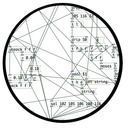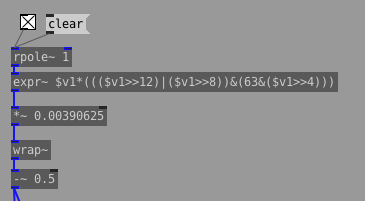@Jona I think the issue with your method is that the value stays the same over the entire block, so using it to drive a function would only output changed values at the beginning of every block.
you could use your method of adding the samples of a block in conjunction with a [tabreceive~] reading from a table that contains every integer from 0 to blocksize-1 and that would work though.
(btw I also have an object in my library [pinb~] that simply outputs the current sample # in the block for situations like this)
also if you do run it at a samplerate of 8000 hz it will take a ~5.5 times longer for rpole~ to not be able to represent than @ 44.1k so in this case it might not be as much of an issue (though obviously a counter that doesn't do that at all is preferable)
of course any method will lose precision between samples, especially if the counter isn't reset to 0 after 2^32 -1 samples (assuming "t" is a 32-bit integer)
in pd-double it would probably be better to use phasor~ with / and *~ to scale phasor to increment 1 every sample, with a period of 2^32 samples. Unfortunately in 32-bit float pd you can only represent up to 24 bits of precision so you can't divide or multiply by 2^32 exactly





